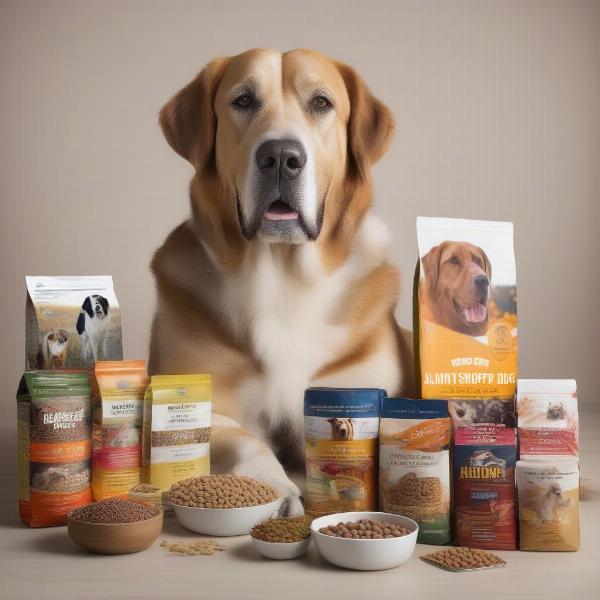Choosing the right food for your large breed dog is crucial for their overall health and well-being. Wholesome large breed dog food provides the specific nutrients these gentle giants need to thrive, supporting their unique physiological demands. From joint health to controlled growth, a balanced and nutritious diet is essential. Let’s explore how to choose wholesome large breed dog food that meets your dog’s individual needs.
Understanding the Nutritional Needs of Large Breed Dogs
Large breed dogs have distinct nutritional requirements compared to their smaller counterparts. Their rapid growth, larger frames, and predisposition to certain health issues necessitate a diet specifically formulated to support them. What does “wholesome” really mean when it comes to large breed dog food? It signifies a balance of high-quality ingredients, avoiding fillers and artificial additives, while focusing on providing optimal nutrition for a healthy, happy life.
What are some key nutritional considerations for large breeds?
- Joint Health: Large breeds are prone to joint problems like hip and elbow dysplasia. Look for foods with glucosamine and chondroitin to support cartilage health.
- Controlled Growth: Rapid growth can exacerbate joint issues. A balanced diet with appropriate calcium and phosphorus levels promotes steady, healthy development.
- Digestive Health: Large breeds can have sensitive stomachs. Wholesome ingredients and prebiotics and probiotics can aid in digestion and nutrient absorption.
Choosing the Right Wholesome Large Breed Dog Food
With so many options available, how do you select the best wholesome large breed dog food for your furry friend? Reading labels carefully is essential. Look for:
- Real Meat as the First Ingredient: This ensures a good source of protein for muscle development and overall health.
- Whole Grains and Vegetables: These provide essential fiber, vitamins, and minerals for a balanced diet.
- Avoid Fillers and Artificial Additives: These offer little nutritional value and can even be harmful.
What about grain-free options? While some dogs may benefit from a grain-free diet, it’s important to consult with your veterinarian before making the switch.
Addressing Common Concerns: Is Grain-Free Always Better?
Is grain-free dog food automatically healthier for large breeds? Not necessarily. While some dogs have grain allergies or sensitivities, grains provide important nutrients. Consult your veterinarian before switching to a grain-free diet. They can help determine if it’s the right choice for your dog’s individual needs.
The Importance of Portion Control and Exercise
Even with the most wholesome food, portion control is key. Overfeeding can lead to obesity, which puts extra strain on joints and can exacerbate health problems. Regular exercise is also essential for maintaining a healthy weight and supporting joint health. What type of exercise is best? Consult with your veterinarian to develop an exercise plan tailored to your dog’s age, breed, and physical condition.
Senior Large Breed Dog Food: Adjusting for Aging Needs
As your large breed dog ages, their nutritional needs change. Senior formulas often contain fewer calories and added joint support. What should you look for in senior large breed dog food? Look for added antioxidants to support cognitive function and ingredients to promote mobility.
 Senior Large Breed Dog Food Choices
Senior Large Breed Dog Food Choices
Conclusion
Choosing wholesome large breed dog food is a crucial step in ensuring your dog’s long-term health and happiness. By focusing on quality ingredients, appropriate portion control, and regular exercise, you can help your gentle giant thrive. Remember to consult with your veterinarian for personalized advice tailored to your dog’s individual needs.
FAQ
- What are the key ingredients to look for in wholesome large breed dog food? Real meat, whole grains or grain-free alternatives, vegetables, and joint supplements like glucosamine and chondroitin.
- How much should I feed my large breed dog? Follow the feeding guidelines on the food packaging and consult with your veterinarian for personalized recommendations.
- When should I switch my large breed dog to senior food? Consult with your veterinarian, as the appropriate age varies based on breed and individual health.
- Is grain-free food always better for large breed dogs? Not necessarily. Consult your veterinarian to determine if a grain-free diet is appropriate for your dog’s specific needs.
- What are some common health concerns for large breed dogs? Joint problems, such as hip and elbow dysplasia, and bloat are common concerns for large breed dogs.
- How can I help prevent joint problems in my large breed dog? Feeding a wholesome diet with joint supplements and maintaining a healthy weight through proper portion control and regular exercise can help support joint health.
- What are some signs my large breed dog might have a food allergy? Itching, skin irritation, digestive upset, and ear infections can be signs of a food allergy. Consult with your veterinarian for diagnosis and treatment.
ILM Dog is your trusted partner in dog care and nurturing. We provide expert advice on various aspects of dog ownership, from breed selection and healthcare to training, nutrition, and more. Whether you’re a new dog owner or a seasoned pro, ILM Dog is here to help you provide the best possible care for your furry friend. Contact us for personalized advice and support: Email: [email protected], Phone: +44 20-3965-8624. Visit ILM Dog today!